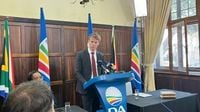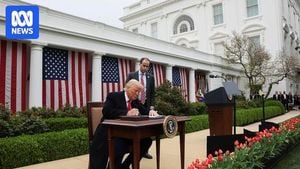In a contentious session held on Wednesday, April 2, 2025, South Africa’s National Budget was passed by a slim majority of 192 votes in favor and 182 against, following a protracted debate filled with heckling and accusations of illegality. The vote, which was characterized by mudslinging and multiple points of order, saw significant divisions among political parties within the Government of National Unity, particularly with the African National Congress (ANC) and the opposition parties.
The National Treasury has been tasked with finding alternative solutions to raising the value-added tax (VAT) and alleviating the income tax burden on the poor, as the contentious fiscal framework was agreed upon without the support of the Democratic Alliance (DA). This decision comes after a previous attempt to pass the budget in February failed due to disagreements over a proposed two-percentage point increase in VAT.
During the debate, the Economic Freedom Fighters (EFF) representative Omphile Maotwe announced that the party would challenge the budget in court, arguing that the legislative process had not adhered to legal standards. Similarly, African Christian Democratic Party MP Steve Swart expressed concerns that National Treasury should have sought the opinion of a senior advocate before proceeding, stating, "it will end up in court."
Today's vote marked the culmination of a series of discussions, including 51 submissions and engagements that took place earlier this week. Notably, the budget’s passage was marred by disruptions, including the ejection of some members who entered the assembly after the doors were locked.
Critics of the budget highlighted the adverse effects a VAT increase would have on the poor, with many arguing that removing the proposed increase and addressing tax bracket creep would leave the government with a revenue shortfall of at least R28 billion. Minister of Finance Enoch Godongwana defended the budget, asserting that any negative impact of a VAT increase would be mitigated by the introduction of VAT-exempt products and increased spending on social services such as healthcare and education. He emphasized that the South African Revenue Service had been allocated additional funds to collect outstanding taxes amounting to R800 billion.
In a passionate defense of the budget, Godongwana stated, "I don’t think you can vote against the budget and tomorrow be part of its implementation." However, various members of Parliament voiced their discontent with the process. The Inkatha Freedom Party (IFP) urged caution in budgeting given the current geopolitical climate, while the Freedom Front Plus (FF+) opposed a VAT increase, warning that it would further burden South Africans already struggling with high unemployment rates.
ActionSA’s Athol Trollip noted the ongoing budget impasse, highlighting the devaluation of the rand during the extended budget deliberations. Swart also cautioned that the fiscal framework relied on an ambitious GDP growth projection of 1.9%, especially since the GDP growth for 2024 was only 0.6% year-on-year.
In light of the contentious discussions surrounding the budget, the Congress of South African Trade Unions (Cosatu) has called for Parliament to make binding a resolution that would require the Treasury to propose alternatives to the planned VAT hike and income tax bracket adjustments within 30 days. Cosatu's parliamentary coordinator, Matthew Parks, stated, "It will be an absolute travesty for parliamentarians to raise the hopes of society that these tax hikes can be avoided, only for Treasury to blue tick Parliament."
Parks emphasized that this proposal would provide crucial relief to millions of workers struggling with rising living costs. He urged Parliament to elevate the finance committee’s recommendations into a binding resolution, ensuring that Treasury returns with clear alternatives to the proposed VAT and personal income tax (PIT) hikes.
Cosatu has put forward several progressive alternative revenue and expenditure proposals to raise similar revenue without further burdening working and middle-class families. These proposals include eliminating tax loopholes exploited by wealthy individuals and corporations, as well as increasing taxes on the rich through income, inheritance, estate, and luxury goods duties.
Additionally, Parks suggested that the South African Revenue Service, which has been allocated an additional R4 billion, should be empowered to tackle the R800 billion in taxes owed to the state. He also proposed that the Reserve Bank should increase its support for the fiscus from its currency reserves, asserting that the R31 billion expected from the VAT hike could be compensated through expenditure reviews.
As the budget discussions unfolded, ActionSA, the IFP, and the ANC voted in support of the flawed fiscal framework, including the VAT increase, in a committee meeting on April 1, 2025. DA's Mark Burke criticized this decision, stating that ActionSA betrayed South Africa by supporting a VAT increase for political gain.
Burke lamented that the opportunity to amend the flawed budget was squandered, calling the process a "farcical day for a farcical process leading to a farcical report." He emphasized that the report generated by Parliament would likely be ignored like many before it, questioning the effectiveness of the parliamentary process in addressing the needs of South Africans.
With the budget now passed, the focus will shift to how the Treasury implements the fiscal framework and whether it can address the growing concerns of citizens regarding tax increases and economic stability. The ongoing tensions among political parties suggest that further debates and potential legal challenges are likely as stakeholders seek to navigate the complexities of South Africa's fiscal landscape.





